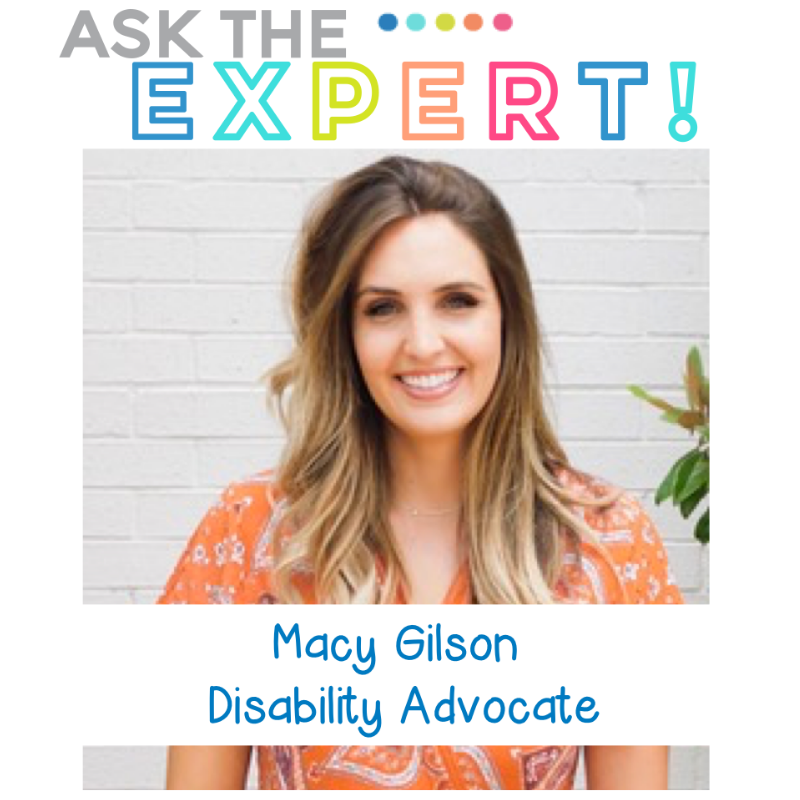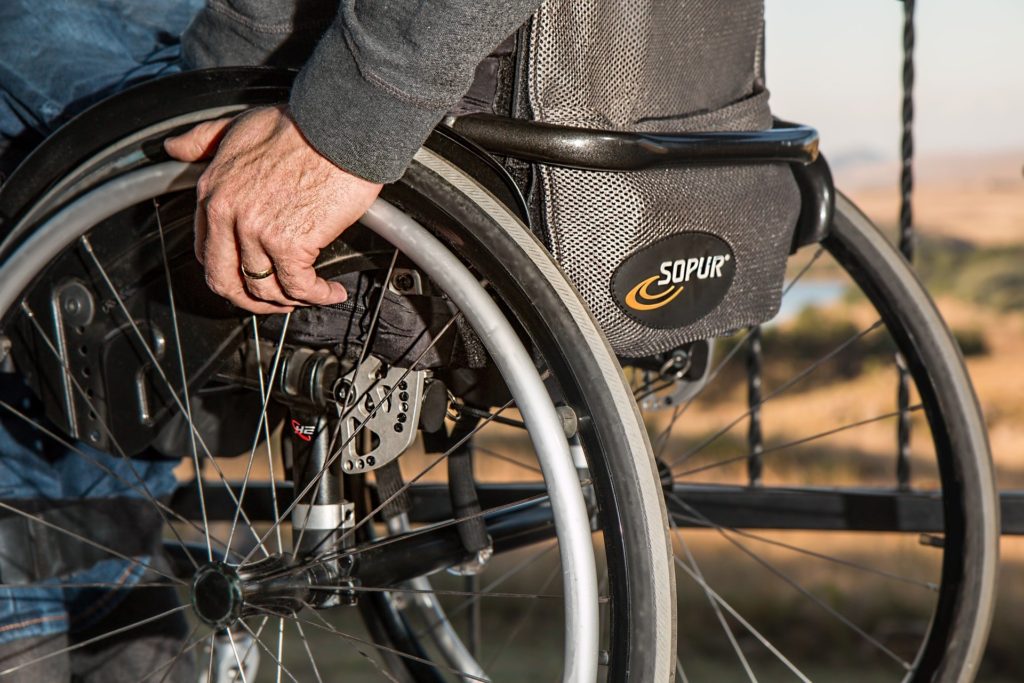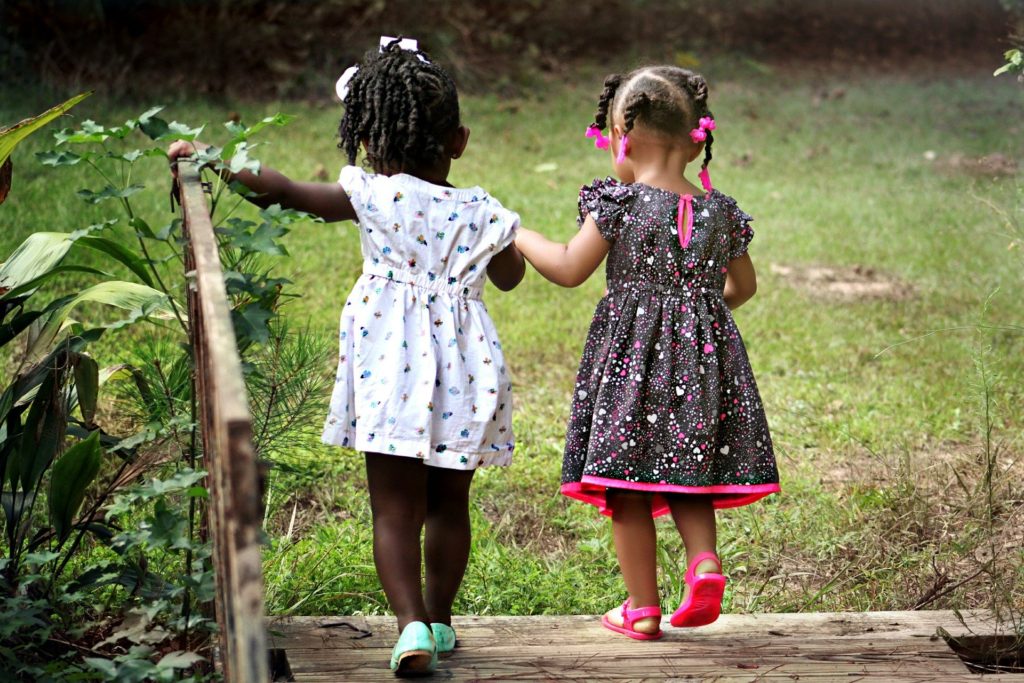This post may contain affiliate links.
Today’s Ask the Expert post is one that is so close to my heart. When I was in high school I volunteered at an early childhood education center. In the classroom I volunteered in, there was a little girl with a variety of specials needs. The first day I was there another little boy in the classroom was trying to tell me about this child. “Her brain doesn’t work the same,” he told me. I thought that was a really profound thing for a four year old child to say about one of his peers. He said it in the kindest way possible and almost told me in a way to protect her. That tiny conversation made me realize how crucial it is for us as teachers and parents to facilitate conversations about children and adults with disabilities. It was such an honor to have this important conversation with my sweet friend, Macy Gilson.

Here is a little bit about Macy:
Macy Gilson is a disability advocate and blogger. She is a California native, but came to the great state of Texas to play volleyball at TCU. After a career-ending spine injury, she poured all of her energy into becoming a Speech-Language Pathologist. She went on to graduate school at Baylor University. She has worked as an SLP in a variety of settings, including private practice, public schools, non-public schools and adult rehabilitation centers. She is married to her college sweetheart and they are the parents of black lab. Macy’s career is treating those with communication disorders, but her biggest dream is sharing their stories. She has created an amazing community and given a voice to many as a disability advocate.
What is a disability advocate?
A disability advocate is someone who provides support for individuals with a diverse range of disabilities. My biggest platform is social media and my blog/website. I aim to spread disability awareness and increase community inclusion, as well as provide support for educators and parents of children with disabilities.
How did you become involved in this field?
I am a speech language pathologist by education and have the privilege of working with both children and adults with a multitude of diagnoses on a daily basis. These diagnoses include autism spectrum disorders, speech/language disorders, hearing loss, physical disabilities, intellectual disabilities and other developmental disorders. In working with these amazing individuals, I have cultivated a passion for not only treating their impairments but sharing their stories.
I believe those brave enough to be vulnerable about their journey make up the strongest communities. As I began to share the stories of families from many different walks of life, I was able to connect parents to others who had walked a familiar path and were facing similar trials and triumphs. In just seven months, our community has grown to over ten thousand people and I am proud to be a member of a group committed to encouraging one another, sharing stories and providing support.

How do you help parents and educators?
I help parents of children with disabilities by connecting them with other families who have walked a similar path, whether that be diagnosis, surgery, hospital stays, physical, occupational, or speech therapies, family life, etc. I equip parents to talk to their children about disabilities by educating them on topics such as awareness, inclusion, and character development. I also provide resources for educators to instill character education and inclusion in their classrooms.
As a mom myself, I love making connections with other parents. When I meet parents of children with disabilities, what can I do to further support and be a friend to them?
The best thing you can do when you meet a parent of a child with disabilities is to build a relationship, just as you would with any other friend. Some parents love to answer questions about their child and some parents would rather not. Some parents want their child’s disability to be acknowledged and some do not. Once you have established trust and have begun to form a relationship, it will likely become clear where your friend stands.
Just as friendship looks different to everyone, so does support. To some parents, support might be a home-cooked meal delivery after a long day at the hospital. To others, it might be a cup of coffee and words of encouragement. The best way to offer support is to be specific. Instead of saying, “Let me know if you need anything!” try, “Can I bring over a meal one night this week? Which day works best for you?” or “I’m going to grab a cup coffee, can I bring one to the hospital?” No one likes to feel like they are asking for help and sometimes a vague offer, such as “Let me know!” can end up without an honest response. Anyone that has lost a family member or has gone through a tragedy knows that it is difficult to respond to a vague offer without feeling demanding. It is so much easier to respond which day would be best for dinner or your favorite coffee order.
More than anything, be yourself! Unfortunately, we live in a culture that ostracizes people who society says are “different.” If you meet a parent of a child with a disability, treat them just as you would any other parent. Parents of children with disabilities are all too familiar with this exclusion and by trying to act or say or be a certain way, you may unintentionally contribute to this exclusion. There is no need to feel awkward or anxious, because chances are, they’re doing their dang best to raise a kind, brave, amazing kid – just like you.

How can parents talk to their children about children with disabilities?
Talk about differences.
Define what “different” means and break the stigma that “different” is bad, scary or weird. Talk about the differences that exist in your family (hair color, eye color, interests, character traits, personalities) and then talk about the differences that exist in your community (race, religion, abilities, etc.)
Use inclusive literature.
Fill your home with books and movies that portray characters with disabilities. The more you expose your children to disabilities, the more inclusive they will be.
Self-reflect.
The example that you set for your children and the way you respond when you interact with someone with disabilities is the best predictor of how your children are going to react. Your actions will show up in their actions, so it is important that you educate yourself. When you see a person with Down syndrome, or you hear the term “developmental disability,” and you aren’t sure what it means, look it up! The more you know, the more you can share with your children.
Encourage questions.
Teach your children that it is okay to ask questions! They don’t do it be malicious or mean, they do it to learn! We live in a world where it’s considered “rude” to ask questions, but the opposite is true. It’s rude to ignore and by taking the opportunity to ask questions away from our children, we reinforce that differences are scary and bad.
Highlight Similarities.
Once you have talked about differences, you should talk to your child about similarities. Draw comparisons by finding things that your child has in common with a child with disabilities. Children do not naturally do this on their own, so it is your job, as a parent to guide them. When children see that others are similar to them, it is a lot easier for them to be inclusive.
What resources are available to help?
There are so many great resources available for both parents and educators in the disability community. On my website, www.macygilson.com, I have free resources and blog posts about disability awareness and education. I also feature a different family every week to connect them to others walking a similar path. Some of my favorite accounts to follow are The Able Fables, The House of Wheeler, Tulips in Tuscany and AbleFinder.

Reader Questions:
Reader questions are my favorites. I would love to have you help choose them each week on Instagram. I really love these questions, because I think they are questions that most of us have had at some point.
My friend recently had a child who was born with a disability. What should I say or do to offer support?
Parents of newly diagnosed children and infants often go through a period of darkness, sadness, and grief. People sometimes ask, “What should I say if my sister/BFF/neighbor/coworker just had a baby with Down syndrome (or any other disability)?” and my biggest piece of advice would be to congratulate them! Treat the arrival of their new blessing as you would any other baby. Often times, when doctors and medical professionals inform expectant parents about a diagnosis, the first words they say are, “I’m so sorry…” It is your job as a friend/sister/coworker to bring positivity and light to the situation. Share in the joy of their new arrival and sit in the grief when they need support.
That being said, there are a couple of things that you should not say:
- “I don’t know how you deal with this. I could never do it!” The reality is, if your child was born with a disability, you absolute WOULD do it. You would bend over backward to make sure your child had the best care, the smartest doctors, the kindest teachers and the most effective therapists. You would step up to the plate and handle it, just like they are.
- “At least he/she doesn’t have _____.” Often times, parents of children with disabilities hear this as “stop complaining” or “it could be worse” which minimizes their feelings and can lead to guilt and comparison.
- “God only gives you what you can handle.” Not only is this statement not Biblical, it also is not true. Usually when parents have a child with a disability, they are looking for support from close family and friends and looking to not feel so alone. Saying something like this can make them feel isolated and as if they have to deal with everything all by themselves.
What picture books do you recommend?
I actually have a blog post on this subject! I also love the Able Fable series from Dr. Nicole Julia! They are rhyming books that feature animals so they are great for younger students just noticing differences in people. Profits from the book are also donated to help build inclusive playgrounds.
Want more from Macy?
I know you do! Following and connecting with Macy has helped me so much as a teacher and a mom! You will love following her on Instagram. She features some truly amazing kids and I love each of the stories she shares. You can also find her on Facebook, Pinterest and her website!
